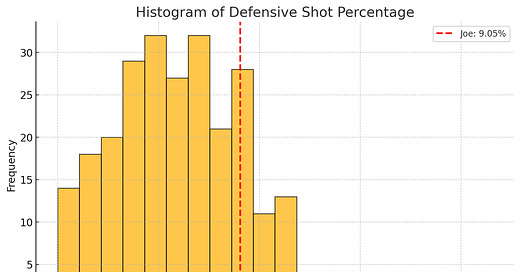I play safeties, a lot compared to others. I often find it to be the best strategy. I think I win more when I look for opportunities for a strong safety. After all, there is no shape better than ball in hand. (Note for non-pool players: Safety shots are also called defensive shots. I will use both terms interchangeably here.)
It’s hard to get good statistics on safety play but I’m going to give it a try here. This chart shows statistics from an 8 ball league I play in. About 9 percent of my shots are marked as defensive, which puts me in the 78th percentile. I suspect that’s even a little low, but it’s low for everyone I guess. I think I should probably play MORE safeties.
I started to really practice safety play around 6 months ago. Around that same time, I started to win a lot more. I think those two things are related.

I’ve been thinking a lot more about when to play a defensive shot versus offense and I’ve spoken to a few other “defensive minded” players.
Here are two philosophies I’ve heard:
As soon as you get out of shape play defense. It’s almost never worth it to shoot the hero shot to get back in shape unless it’s do or die time. Control the cue ball at all costs.
If the odds of a good defense are higher than the odds of making the shot and shaping the next ball, it’s defense time.
I’ve used both of these in a real match situations. The most difficult thing for me was discipline. It’s incredibly hard not to take the shot that, if successful, will get you to the next ball. There is something so powerful about seeing that ball fall. But the “if successful” part is the rub. Success is making the ball and getting position on the next ball. If you make the ball and and safe yourself, and then give up ball in hand, what did you actually accomplish?
We’ve all seen a low skill player with a lot of balls left on the table choose the easier shot that, if missed, will result in perfect shape for the opponent’s last ball or money ball. Often we’ll call timeout to suggest a different ball.
But how often do we do something similar? It’s probably higher than we want to admit. Why is that? If I’m honest, here are my reasons:
Overestimating my actual skill, aka hubris. Yes, I can make this shot during practice, or at home, or when I’m “in-stroke”. But under pressure, with people watching, maybe I’m 50/50. Maybe at midnight I’m 40/60. The truth is, being honest with myself about my true skill level is hard, and humbling.
Caring about what others think. This applies to teammates mostly. After you play a safety, you’re walking back to your team and you may hear: “Why didn’t you take that shot? You’re out if you make it.” It’s worse if the safety leaked by. (It happens.) The truth is every shot looks easier from the gallery, especially if you have more skill and zero stress. If I don’t think I’m going to make it, I probably won’t.
Trying to model my game after the pros. Professionals don’t play that many safeties, especially in 8 ball. That’s certainly true but, professionals don’t miss shape very often either do they? I think most of us greatly underestimate the distance between even the best players we know and the pros. Pros would destroy the best players in your pool hall and mine. The top pros aren’t playing the same game we are. When is the last time an opponent ran 4 racks in a row on you? It doesn’t happen in my pool hall but it does happen in pro tournaments and it’s not that rare. The truth is I will NEVER be pro speed. It’s not happening. (Another thing to consider is pros play in MUCH harder conditions than we do and still perform: new/slick cloth where spin doesn’t take, smaller pockets, bright lights and crowds, high stakes, etc.)
Wanting it to be over. Matches can be stressful, especially after you get behind or you’re playing someone you should beat or it’s 1:30 in the morning. Stress does funny things. Suddenly my stroke isn’t straight. Maybe my strategy is clouded. We’ve all felt the effects of nerves. Sometimes we think the room is too hot or too cold when it was fine earlier. We don’t like feeling stress so we look for ways to make it stop. Rushing to get it over with is one way to do that. Playing a defensive shot can make the game longer, especially if your opponent escapes. The truth is stress impacts my play sometimes. I have to learn to manage it if I want to get better. Grinding out a win from behind is incredibly rewarding, that’s the feeling I should focus on.
Notice that ALL of these are mental and hard to practice. Items 1 and 4 are the worst for me. As I’ve improved, my team seems to trust my decision making (or gave up 🙂) and I know to watch the pros mostly to marvel at it.
Contrary to what I said at the beginning of this post, I don’t think I win more, I know I win more when I play more defense. Since that’s the point, winning, I will continue to defense, probably more than everyone else.
If you self-assess honestly, should YOU play more defense? Why don’t you?




